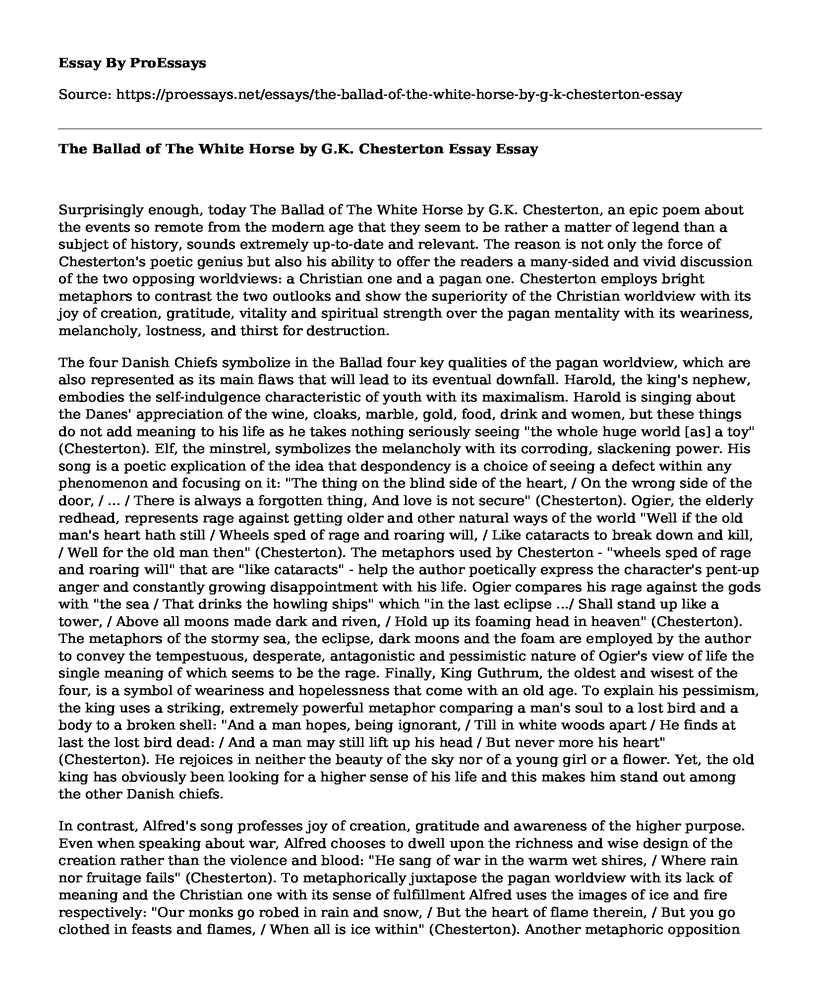Surprisingly enough, today The Ballad of The White Horse by G.K. Chesterton, an epic poem about the events so remote from the modern age that they seem to be rather a matter of legend than a subject of history, sounds extremely up-to-date and relevant. The reason is not only the force of Chesterton's poetic genius but also his ability to offer the readers a many-sided and vivid discussion of the two opposing worldviews: a Christian one and a pagan one. Chesterton employs bright metaphors to contrast the two outlooks and show the superiority of the Christian worldview with its joy of creation, gratitude, vitality and spiritual strength over the pagan mentality with its weariness, melancholy, lostness, and thirst for destruction.
The four Danish Chiefs symbolize in the Ballad four key qualities of the pagan worldview, which are also represented as its main flaws that will lead to its eventual downfall. Harold, the king's nephew, embodies the self-indulgence characteristic of youth with its maximalism. Harold is singing about the Danes' appreciation of the wine, cloaks, marble, gold, food, drink and women, but these things do not add meaning to his life as he takes nothing seriously seeing "the whole huge world [as] a toy" (Chesterton). Elf, the minstrel, symbolizes the melancholy with its corroding, slackening power. His song is a poetic explication of the idea that despondency is a choice of seeing a defect within any phenomenon and focusing on it: "The thing on the blind side of the heart, / On the wrong side of the door, / ... / There is always a forgotten thing, And love is not secure" (Chesterton). Ogier, the elderly redhead, represents rage against getting older and other natural ways of the world "Well if the old man's heart hath still / Wheels sped of rage and roaring will, / Like cataracts to break down and kill, / Well for the old man then" (Chesterton). The metaphors used by Chesterton - "wheels sped of rage and roaring will" that are "like cataracts" - help the author poetically express the character's pent-up anger and constantly growing disappointment with his life. Ogier compares his rage against the gods with "the sea / That drinks the howling ships" which "in the last eclipse .../ Shall stand up like a tower, / Above all moons made dark and riven, / Hold up its foaming head in heaven" (Chesterton). The metaphors of the stormy sea, the eclipse, dark moons and the foam are employed by the author to convey the tempestuous, desperate, antagonistic and pessimistic nature of Ogier's view of life the single meaning of which seems to be the rage. Finally, King Guthrum, the oldest and wisest of the four, is a symbol of weariness and hopelessness that come with an old age. To explain his pessimism, the king uses a striking, extremely powerful metaphor comparing a man's soul to a lost bird and a body to a broken shell: "And a man hopes, being ignorant, / Till in white woods apart / He finds at last the lost bird dead: / And a man may still lift up his head / But never more his heart" (Chesterton). He rejoices in neither the beauty of the sky nor of a young girl or a flower. Yet, the old king has obviously been looking for a higher sense of his life and this makes him stand out among the other Danish chiefs.
In contrast, Alfred's song professes joy of creation, gratitude and awareness of the higher purpose. Even when speaking about war, Alfred chooses to dwell upon the richness and wise design of the creation rather than the violence and blood: "He sang of war in the warm wet shires, / Where rain nor fruitage fails" (Chesterton). To metaphorically juxtapose the pagan worldview with its lack of meaning and the Christian one with its sense of fulfillment Alfred uses the images of ice and fire respectively: "Our monks go robed in rain and snow, / But the heart of flame therein, / But you go clothed in feasts and flames, / When all is ice within" (Chesterton). Another metaphoric opposition used to contrast the two cultures is "feasting vs fasting": "If it be not better to fast for joy / Than feast for misery" (Chesterton). Through this metaphor, Alfred expresses the idea that the hardships Christians are enduring are made meaningful and therefore easier to bear thanks to the higher purpose of their lives, while even abundance does not bring the Danes any joy because they have no hope.
Conclusion
Thus, Alfred methodically refutes the criticism of the Danes proving how much happier and more fulfilling the life in the Christian faith is. A contemporary individual in the constant search for the sense of life, meaningfulness and a life mission cannot but find this poetic exploration very insightful.
Reference
Chesterton, G. K. (2008, September 21). The Ballad of The White Horse. Retrieved April 24, 2018, from https://www.gutenberg.org/files/1719/1719-h/1719-h.htm.
Cite this page
The Ballad of The White Horse by G.K. Chesterton Essay. (2022, May 17). Retrieved from https://proessays.net/essays/the-ballad-of-the-white-horse-by-g-k-chesterton-essay
If you are the original author of this essay and no longer wish to have it published on the ProEssays website, please click below to request its removal:
- Onset of Great Expectations
- Essay Example on Faust: A German Legend
- Essay Example on Dreaming in Cuban by Cristina Garcia
- Essay on Myceneans: Pioneers of Ancient Greece and Language
- Essay on Mary Shelley's Frankenstein: Social Psychology and the Search for Knowledge
- Shakespeare and the Portrayal of Women: Macbeth and Romeo and Juliet
- Ideas on Behaviour of Fish in an Egyptian Tea Garden Essay







